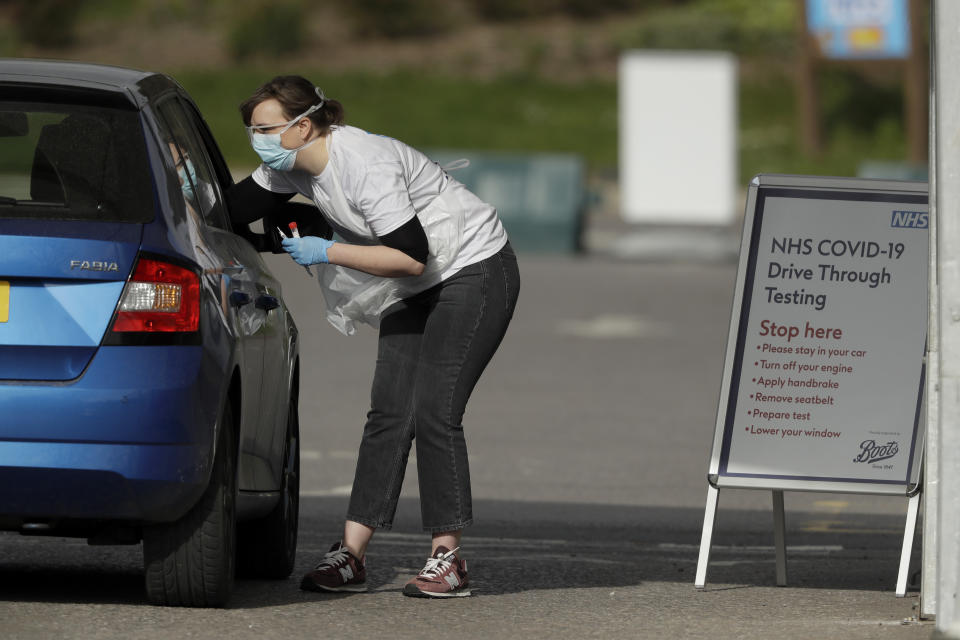Coronavirus pandemic 'may have peaked' as UK deaths rise to 12,868
Recent death figures indicate the UK’s coronavirus pandemic may have peaked, an expert has said.
Professor James Naismith, director of the Rosalind Franklin Institute and professor of structural biology at the University of Oxford, also warned that lifting restrictions on movements will result in deaths.
But the measures have worked, he said, even though many deaths will continue to be reported daily, in comments later echoed by England’s chief medical officer Chris Whitty.
“Provided delays due to the Easter weekend have not distorted these figures, then today’s number of announced hospital deaths taken with the last week of data does indicate that this measure of the pandemic may indeed have peaked,” Naismith said.

“If true, any sense of relief must be tempered by the fact that we will see hundreds of hospital deaths announced each day for some time ahead.
“This number of deaths is an underestimate of the true toll and will increase as deaths in care homes and the wider community are added. However, I do not expect these deaths to significantly alter our understanding of when the peak has occurred.”
Whitty said on Wednesday afternoon: "Our view is that it is probably reaching the peak overall," adding that statistical lags meant the number of deaths may go up in the coming days.
He said: "We are not yet at the point where we can say confidently and safely 'this is now past the peak and we can start thinking very much now about the next phases.'"
The number of people in the UK who have died after contracting coronavirus has risen 761 to 12,868, official figures this afternoon show.
There are also now 98,476 confirmed cases.
In England, the number of deaths has risen by 651, up to 11,656.
Scotland today reported a further 84 deaths, while Wales has recorded 60 new deaths and Northern Ireland has posted six, for a combined rise of 150 for those three nations.
The combined figure for all four nations brings the total number of deaths to 12,958, but that number varies from the UK-wide figure published by the Department of Health because of differences in accounting methods.
The UK-wide figure posted by the department is accurate to 5pm on 14 April, and the cases are from data up to 9am today.
Latest coronavirus news, updates and advice
Live: Follow all the latest updates from the UK and around the world
Fact-checker: The number of COVID-19 cases in your local area
6 charts and maps that explain how COVID-19 is spreading
“It is worth noting that if the death toll has indeed peaked, it suggests that the softer social distancing measures introduced before the lockdown may have had some positive effect and a bigger effect can therefore be expected as the lockdown measures work through,” Prof Naismith added.
“Public support for these measures has been crucial and saved lives.
“We do not yet have vaccine or a guaranteed safe lifesaving medicine. Without either of these available to us, whatever we do next – in terms of extending or lifting various social distancing and shielding measures – will almost certainly result in deaths, either directly from COVID-19 infection or indirectly from the consequences of the lockdown.”
He said the government will need to be clear about the way it will lift restrictions and the consequences its actions will have.
The new 4,000-bed capacity NHS Nightingale Hospital in east London, built at the ExCel centre to help with increased demand for treatment during the pandemic, only had 19 patients over Easter weekend.
According to data from the Health Service Journal, the hospital remained largely empty, which was reportedly down to tight criteria agreed for patients to be admitted there.
The hospital was created by NHS staff, contractors and the military in just 10 days.
An NHS England spokesperson said: “While the data quoted here are not complete and validated, they confirm continuing success in ensuring we have available capacity to look after patients who need our care, which has been one of our overarching operational goals since the start of the coronavirus pandemic.”
Meanwhile, the government continues to receive criticism for its testing regime.
Increased focus has been given to care homes, where residents are vulnerable to COVID-19 due to their age.
A quarter of all registered deaths involving COVID-19 in Scotland occurred in care homes, according to the National Records of Scotland.
In England, eight people died with suspected coronavirus at Green Heys Care Home in Waterloo, Merseyside.
Health secretary Matt Hancock has promised to provide tests to all who need them, but an NHS Confederation director said clarity was needed about how the government plans to run 100,000 tests a day.
“The offer of more tests for social care staff is desperately needed as this sector has been suffering in silence during this pandemic,” Dr Layla McCay said.
“But it comes as health leaders across primary, community and mental health services are continuing to experience difficulties with getting their staff the tests they need to get back to work, despite similar promises being made by government.
“Things are improving but the country’s testing capacity is far from where it needs to be to meet the ambition of 100,000 a day in just over two weeks – that’s over 85,000 more tests a day than what is happening now.
“We need absolute clarity from the government on how this will be achieved in such a short space of time, otherwise it will be viewed as a false promise.”
Hancock said: “I am deeply conscious that people in residential care are among the most vulnerable to coronavirus. We are doing everything we can to keep workers, residents and their families safe.”
A COVID-19 social care action plan is due to be announced by the government this week.

 Yahoo News
Yahoo News 
